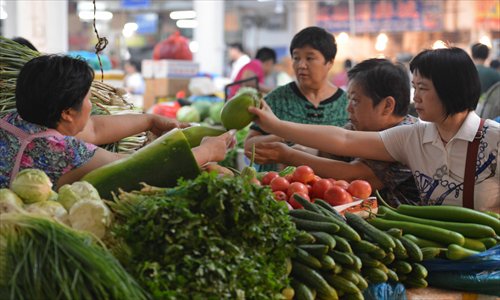How Spread of Bt Cotton Contaminates the Food Chain
Bharat Dogra
The author is a free-lance journalist who has been involved with several social initiatives and movements.
While hazardous GM technology was allowed to be spread more easily in cotton on the ground that it is a non-food crop, it is clear that when cattle, sheep, goats etc. feed on Bt cotton residues, then health hazards also spread to the entire food-chain.
According to the Centre for Sustainable Agriculture, Hyderabad, “Bt (bacillus thuringiensis) toxin in its natural, non-GM form, when used as an insecticidal spray, behaves differently in the environment than Bt toxin produced in GM plants. Natural Bt toxin breaks down in daylight and only becomes active in the guts of insects. However, with GM Bt crops, the plant is engineered to express the Bt protein in every cell. If any part of the plant is eaten, the toxin is inevitably consumed.”
This threat to the food-system from Bt cotton will grow in future keeping in view the on-going efforts to find more ways of processing cottonseeds to make them consumable by human beings in attractive ways.
In this context what is most worrying is that many cattle and other farm animals have perished (or else their health has suffered badly) after eating Bt cotton residues.
According to a cover-story in the Tehelka journal, “The GEAC (Genetic Engineering Approval Committee) in January 2008, cited reports from the Indian Veterinary Research Institute (IVRI) and the Andhra Animal Husbandry Department which showed ‘conclusive proof of safety’ to animals from Bt cotton feed.
“But when Anthra, a veterinary research organisation, filed an RTI with the IVRI asking for a copy of the report, the institute responded saying ‘no studies had been done by them and that the IVRI had not submitted any reports to the GEAC’.”
Dr Sagari R. Ramdas, co-Director of Anthra, writes: “Since 2005, shepherds and farmers from different parts of India, particularly the states of Andhra Pradesh, Haryana, Karnataka and Maharashtra, have reported their cattle falling sick after it has grazed on genetically modified cotton or have been fed Bt cotton seeds and in some instances have died. Despite several reports and representations to concerned regulatory and research institutions both at national and state levels, alerting them to the seriousness of the issue, there has been a persistent reluctance amongst the scientific establishment to respond, investigate and research the core issue. On the contrary the reaction of the establishment has been bureaucratic and dismissive of the observations.
“Between 2005 and 2009 Anthra, an organisation led by women veterinary scientists researching the impact of Bt cotton on animals in different parts of India, has been closely investigating the reported morbidity and mortality observed in sheep and goat flocks, which have been grazed on harvested Bt cotton crop in Andhra Pradesh. Shepherds unambiguously declared that their animals, which had never died or fallen sick while being grazed on regular cotton fields since the past 10 years, began to exhibit morbid changes when grazed on the GM crop.
“In Haryana, there was a strong correlation between feeding Bt cotton seeds and cotton seed cake to milch animals, and drop in milk yield and several reproductive disorders such as prolapse of uterus, premature birth of calves, increase in the incidence of abortions and decrease in conception rate.”
In addition it should be noted that longer-duration studies have further confirmed the high risk of GM foods. As the Centre for Sustainable Agriculture has pointed out, “GM crops are usually approved on the basis of tests performed by the industry on rats and other animals over periods of upto 90 days. In rats, this corresponds to a human life span of about 12 years. This is much too short for long-term health effects such as organ damage or cancer to show up. The first long term independent study ‘Long term toxicity of a Roundup herbicide and a Roundup tolerant genetically modified maize’ by the French molecular biologist, G.E. Seralini of the Committee for Research and Independent Information on Genetic Engineering (CRIIGEN), came out in 2012. This two-year study linked herbicide tolerant maize and the glyphosate-based herbicide Roundup to premature death and cancer in rats. Although this peer reviewed study has been criticised by a number of regulators and scientists (many with industry links), this study has also received statements of support and positive comments from more than 300 scientists from 33 countries.” MAINSTREAM WEEKLY
While hazardous GM technology was allowed to be spread more easily in cotton on the ground that it is a non-food crop, it is clear that when cattle, sheep, goats etc. feed on Bt cotton residues, then health hazards also spread to the entire food-chain.
According to the Centre for Sustainable Agriculture, Hyderabad, “Bt (bacillus thuringiensis) toxin in its natural, non-GM form, when used as an insecticidal spray, behaves differently in the environment than Bt toxin produced in GM plants. Natural Bt toxin breaks down in daylight and only becomes active in the guts of insects. However, with GM Bt crops, the plant is engineered to express the Bt protein in every cell. If any part of the plant is eaten, the toxin is inevitably consumed.”
This threat to the food-system from Bt cotton will grow in future keeping in view the on-going efforts to find more ways of processing cottonseeds to make them consumable by human beings in attractive ways.
In this context what is most worrying is that many cattle and other farm animals have perished (or else their health has suffered badly) after eating Bt cotton residues.
According to a cover-story in the Tehelka journal, “The GEAC (Genetic Engineering Approval Committee) in January 2008, cited reports from the Indian Veterinary Research Institute (IVRI) and the Andhra Animal Husbandry Department which showed ‘conclusive proof of safety’ to animals from Bt cotton feed.
“But when Anthra, a veterinary research organisation, filed an RTI with the IVRI asking for a copy of the report, the institute responded saying ‘no studies had been done by them and that the IVRI had not submitted any reports to the GEAC’.”
Dr Sagari R. Ramdas, co-Director of Anthra, writes: “Since 2005, shepherds and farmers from different parts of India, particularly the states of Andhra Pradesh, Haryana, Karnataka and Maharashtra, have reported their cattle falling sick after it has grazed on genetically modified cotton or have been fed Bt cotton seeds and in some instances have died. Despite several reports and representations to concerned regulatory and research institutions both at national and state levels, alerting them to the seriousness of the issue, there has been a persistent reluctance amongst the scientific establishment to respond, investigate and research the core issue. On the contrary the reaction of the establishment has been bureaucratic and dismissive of the observations.
“Between 2005 and 2009 Anthra, an organisation led by women veterinary scientists researching the impact of Bt cotton on animals in different parts of India, has been closely investigating the reported morbidity and mortality observed in sheep and goat flocks, which have been grazed on harvested Bt cotton crop in Andhra Pradesh. Shepherds unambiguously declared that their animals, which had never died or fallen sick while being grazed on regular cotton fields since the past 10 years, began to exhibit morbid changes when grazed on the GM crop.
“In Haryana, there was a strong correlation between feeding Bt cotton seeds and cotton seed cake to milch animals, and drop in milk yield and several reproductive disorders such as prolapse of uterus, premature birth of calves, increase in the incidence of abortions and decrease in conception rate.”
In addition it should be noted that longer-duration studies have further confirmed the high risk of GM foods. As the Centre for Sustainable Agriculture has pointed out, “GM crops are usually approved on the basis of tests performed by the industry on rats and other animals over periods of upto 90 days. In rats, this corresponds to a human life span of about 12 years. This is much too short for long-term health effects such as organ damage or cancer to show up. The first long term independent study ‘Long term toxicity of a Roundup herbicide and a Roundup tolerant genetically modified maize’ by the French molecular biologist, G.E. Seralini of the Committee for Research and Independent Information on Genetic Engineering (CRIIGEN), came out in 2012. This two-year study linked herbicide tolerant maize and the glyphosate-based herbicide Roundup to premature death and cancer in rats. Although this peer reviewed study has been criticised by a number of regulators and scientists (many with industry links), this study has also received statements of support and positive comments from more than 300 scientists from 33 countries.” MAINSTREAM WEEKLY





